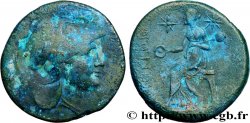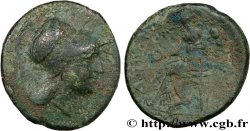bgr_237393 - BRUTTIUM - LOCRI Quart d’unité
Not available.
Item sold on our e-shop (2011)
Price : 50.00 €
Item sold on our e-shop (2011)
Price : 50.00 €
Type : Quart d’unité
Date: c. 281-272 AC.
Mint name / Town : Bruttium, Locres
Metal : copper
Diameter : 15,5 mm
Orientation dies : 6 h.
Weight : 4,94 g.
Rarity : R1
Coments on the condition:
Exemplaire sur un un petit flan épais bien centré des deux côtés. Beau portrait d’Athéna au droit. Joli revers avec l’ethnique bien lisible. Belle patine vert olive foncé
Catalogue references :
Obverse
Obverse description : Tête d’Athéna à droite, coiffée du casque corinthien à aigrette.
Obverse legend : [EU].
Reverse
Reverse description : Grand foudre ailé.
Reverse legend : LOKRWN/ [KA]L.
Commentary
Poids lourd. L’un des exemplaires de l’American Numisamtic Society (ANS. 543) pèse 4,92 g.








 Report a mistake
Report a mistake Print the page
Print the page Share my selection
Share my selection Ask a question
Ask a question Consign / sell
Consign / sell
 Full data
Full data
